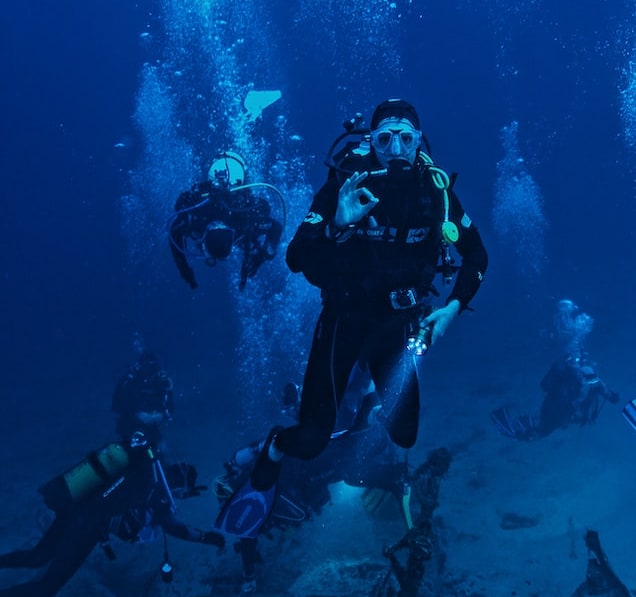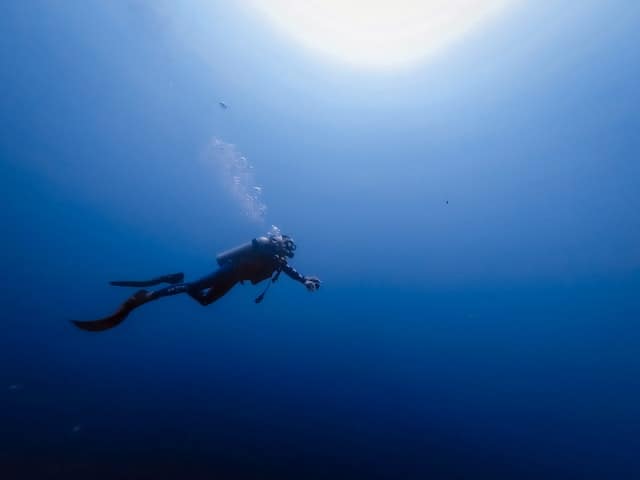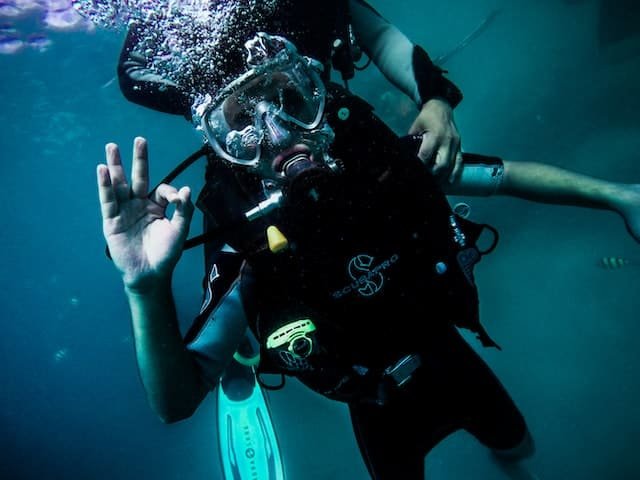Do a trip under the sea, but don’t go until you’ve had enough training because diving can be both exciting and dangerous. Many things can affect a diver’s well-being while below, including the depth and length of the dive, the diver’s physical condition, the breathing gas, and the equipment used. However, “decompression” is an important consideration that must not be overlooked. What is it, though, and why is it so significant to scuba diving? Let’s dive in!
Importance Of Decompression

Decompression is like a graceful dance between man and the ocean depths. The diver’s body and mind must have reached a state of perfect harmony, performing a balance of safety and survival. The pressure and the amount of nitrogen absorbed by the body both rise as the diver goes deeper and deeper into the ocean. The bends, a painful and potentially fatal condition caused by nitrogen bubbles in the blood, would build up inside the diver like carbon dioxide in a soda bottle that has been violently shaken without the proper decompression.
Decompression also allows divers to safely unravel the mysteries of the deep. As the absorbed nitrogen is gently released, the diver ascends with grace and precision, ensuring a successful and mesmerizing dive, where the hidden wonders of the ocean can be explored without fear, thanks to this process.
Possible Effects Of No Decompression
Diving is an adventure that is open to everyone, regardless of age or ability. Whether you’re a curious child or a seasoned retiree, the underwater world awaits your discovery. While diving can be a safe and exhilarating experience, it’s essential to take the necessary precautions to ensure a smooth dive. One key aspect to consider is decompression, which can prevent the following if executed correctly.
🟦 Nausea
When diving beneath the waves, “the bends,” also known as DCS or Decompression Sickness, is an expected threat. Nausea is a major symptom of this condition, but there are also other potential causes of this symptom. If you’re worried about getting seasick while diving, try to ignore that fear. But seek immediate medical attention if you experience unexplained illness. You can ask your doctor about medication that could help, or he or she could refer you to a specialist if the problem is severe.
🟦 Fatigue
Fatigue is a common and dangerous threat to divers. It can sneak up on you in many ways, from not getting enough sleep before a dive to dealing with stress from other aspects of your life to even something as simple as dehydration. Imagine feeling tired and drowsy in the water, unable to focus on your surroundings, and making mistakes that could put yourself and others at risk. Don’t let fatigue sabotage your dive. Be aware of the warning signs, stay hydrated and take steps to manage stress before you take the plunge.
Decompression Sickness

Dive to great depths, but beware of the silent killer: decompression sickness (DCS). Symptoms like nausea, fatigue, and pain in the joints or muscles can appear suddenly and can be fatal if the condition is not treated. Don’t let DCS sneak up on you. If you’re experiencing any of these signs after a dive, get checked out right away. Prior to that, however, we should discuss the potential dangers and causes of DCS.
🟦 Risks
As you go deeper into the depths of the ocean and push the limits of your energy, the risk of decompression sickness (DCS) becomes larger. Each passing moment spent at great depths and every strenuous dive you undertake increases the likelihood of being a victim of this condition. But it’s not just the depth and intensity of your dives that put you at risk, the sheer number of dives performed in a single day can also add to the danger.
Every time you make a decompression stop, you’re giving bubbles the opportunity to form and grow to a size that could spell trouble on your dive. Be mindful of the risks and take all precautions to ensure a safe dive.
🟦 Reasons
Even though scuba diving to great depths can be an exciting adventure, divers must always remember to follow proper decompression procedures. Decompression monitoring becomes more critical the longer you stay at a given depth and the faster you ascend or descend. Decompression sickness, where the body is exposed to too much pressure and oxygen, is a serious condition that can result from failure to take these precautions. However, if you keep these tips in mind, you can experience the ocean’s wonders without risking your health.
If you’ve ever seen someone getting bent out of shape during a dive, then no doubt that person was suffering from DCS. This condition can be extremely painful and even life-threatening if left untreated.
There are several ways people get bent:
- Accidentally ascending too quickly.
- Staying at depth for too long.
- Coming up from deep dives too slowly or without proper stops along the way.
- Doing multiple dives back-to-back without giving their bodies time between them.
That’s why it’s important to know how to decompress safely. Check the next section!
How To Safely Decompress Before Diving?
Scuba diving is a thrilling way to explore the depths of the ocean and see the amazing creatures and sights that lie just below the surface. If you’re thinking about diving, though, decompression is essential. If you skip this step, you could end up with serious problems like impaired oxygen absorption or even nitrogen narcosis or decompression sickness (DCS). Don’t let potential dangers prevent you from diving. If you follow our decompression procedures, you can dive to very deep depths without worrying about your safety.
🟦 Ensure you have the right information before heading out to sea.
The first thing to do is check the weather and sea conditions. If it’s raining or if there are strong winds and choppy waters, it’s best not to dive. The same goes for very hot days or extreme cold snaps. You’ll want to avoid diving when the visibility is low. This can be dangerous because of the risk of getting lost in murky water. And it’s equally important that you know about any tidal changes before you go out on your dive trip.
Divers should be aware of currents because they can make the activity more challenging or even dangerous. Before getting in the water, divers should check the temperature of the water and take note of how comfortable their wetsuits are. Some people find that wearing two sets at once provides the best insulation from the water’s colder temperatures for extended periods of time.
🟦 Decompress in a controlled environment.
Diving with decompression after a long and stressful day shouldn’t be taken lightly. To truly decompress, it’s essential to create a controlled environment that promotes calmness. A wise move would be to avoid any activities that could overwork your body and mind.
Substances that make it difficult to concentrate or cause sleepiness should also be avoided. Alcohol and other drugs are included in this category. Keeping away from these things will help you decompress in the most secure and manageable way.
🟦 Ensure your equipment is in good condition and that you have all necessary safety equipment.
Before diving, ensure that safety is your top priority. Take a moment to check the depth gauge on both tanks and verify that the air pressure levels are sufficient. Remember, if pressure is low, it’s important to obtain a new tank immediately.
Plus, check for leaks in the regulator hose that leads from your tank to your buoyancy compensator. These links are vital to your security as you travel down and up. In the event of a malfunction, a serious accident could occur, increasing the risk of serious injury or even death. In order to avoid any mishaps in the vast and lonely ocean, you should check everything twice before setting out on your underwater journey.
🟦 Avoid overexertion during your surface interval.
It’s tempting to use the surface interval as a chance to get some exercise and stretch out, but it’s important to avoid strenuous physical activity during this time. Strenuous exercise can increase blood flow to your muscles and cause them to swell. This could make future dives more difficult or even unsafe. In addition, overexertion will raise body temperature and heart rate. These are the two things that should remain stable before diving again.
Do not lift heavy things or do other hard work during this time. Doing so could increase the pressure on your joints, which could cause pain or injury when you go back underwater (or later in life). Similarly, avoid overdoing it on the exercise front. During the surface interval, you should stop exercising right away if you feel any kind of pain, even mild soreness.
BONUS: How To Dive Properly?

Whether you’re a beginner or an experienced diver, there are certain steps that must be taken in order to dive properly. Whether you’re doing it for fun or want to get certified, these tips will guide you through everything you need to know.
🟦 Decide where you want to go
As a diver, picking the right dive site is important for having a safe and fun time. Imagine crystal clear waters with impressive visibility, where the depth is just right and the current conditions are ideal.
If you want to know if a dive site is safe, you can either ask other divers who have been there or read reviews online. You should rethink your location choice if there are any warning signs or potential hazards in the area.
Before you go scuba diving, it’s a good idea to familiarize yourself with the dive site by viewing photos or videos. This will ensure that your expectations for the dive are reasonable and that you have a positive experience overall. Don’t let a lack of preparation spoil your time underwater; instead, make sure you’re well-prepared by reading up on safe diving practices beforehand.
🟦 Choose a good time for your dives
Morning dives are best for beginners because the water will be calm and visibility will be high. If you are an advanced diver who can handle strong currents and choppy waters, then diving in the afternoon or evening is also fine. However, if you’re new to diving and not used to dealing with rough seas yet, then night dives aren’t recommended!
The optimal time for a dive trip can also be affected by the weather. Make sure your plans won’t be disrupted by the possibility of wet weather or high winds at any point in your journey.
🟦 Prepare your gear and diving equipment
Before diving into the depths, ensure that your equipment is in top-notch condition. Check for proper fit and any signs of damage, and replace any gear that doesn’t meet the mark. Don’t be afraid to ask for advice from experienced divers, and always follow their instructions. Knowing the conditions of the dive site, including the depth and temperature of the water as well as potential currents or waves, is essential for a safe and successful dive. Don’t take unnecessary risks! Be prepared and dive with confidence.
🟦 Dive with a buddy (Don’t do it alone)
There should never be a situation where a diver is diving alone. When diving, it’s always a good idea to have a diving partner so you can check in on each other and make sure everything is okay. If something goes wrong, like the air supply being cut off or something similar, a friend can help out in an emergency.
If you are diving alone, however, there will be no one else around who could potentially assist in any way if something went wrong during the dive (such as being unable to breathe). This leaves only one option: surface immediately and give yourself up as lost so that others may come rescue/rescue yourself from danger!
Frequently Asked Questions
Q1. How long does it take for the effects of decompression sickness to wear off?
Decompression sickness, also known as the bends, can affect individuals differently. While some may recover within 24-48 hours, others may take longer for their body to heal. But regardless of the timeline, rest assured that the body has the ability to heal itself. However, if symptoms persist or worsen after the initial recovery period, it’s essential to inform your doctor for proper diagnosis and treatment.
Q2. Can I dive again after an episode of decompression sickness, or do I need to wait longer?
You should wait for at least two to three days before diving again if you have had an episode of decompression sickness. Your doctor may want you to take some tests before they clear you for diving again, so be sure to follow their advice carefully. If it has been less than 12 hours since the end of your last dive, there is no need to worry about getting decompression sickness during this time period (unless there were problems during the last dive).
Q3. When should I stop diving?
If you are experiencing any symptoms of decompression sickness, it is important to stop diving immediately. These include:
- numbness or tingling in hands and feet
- weakness in arms or legs
- confusion or dizziness
If you are pregnant, it’s best to avoid diving entirely until after birth. This is because the increased pressure can cause complications for both mother and child. If you do choose to dive while pregnant, make sure that all equipment is checked before use.
In addition, any medications should be discussed with a doctor beforehand so that they know exactly what conditions apply when using specific drugs such as antihistamines (which some divers take before diving). These could interact negatively with other medications taken during a dive trip such that further research might need to be conducted before deciding whether or not such trips should go ahead at all!
Final Words
Decompression is the key to unlocking the awe-inspiring world of breath-hold diving. But heed this warning! Without a thorough understanding of its intricacies and proper execution, it can prove fatal. Don’t let a lack of knowledge hold you back from experiencing the beauty beneath the waves.
So if you’re a scuba diver or a snorkeler, and you’re reading this because you have questions about decompression sickness and diving, we hope this article has answered those questions. Have fun diving!
